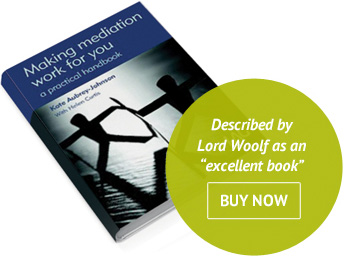BLOG
Mediation Uncovered!
October 11, 2016
Thanks to all today’s panellists for a stimulating and revealing afternoon facilitated by Helen Curtis at Garden Court Chambers.
Eileen Carroll QC (Hon), Graham Ross and Stephen Walker spoke about the pressure of being a client, the responsibility of making a possibly life-changing decision during mediation and the need to know beforehand what you want out of the mediation. Although an advantage of mediation is that it is less stressful than litigation, this doesn’t mean you can skimp on preparation. In fact the marathon of mediation needs very thorough preparation, not just of the case but of you, the client. The advice was to make sure you sleep enough, exercise or walk your dog before entering the mediation room. In short, do what you need to do to get ready for a challenging process. It was recognised that as a client of mediation you may be bored, frustrated and may need to be more demanding of you mediator. The debate then ranged from whether or not mediation should be mandatory or remain voluntary and the benefits of online dispute resolution (ODR). On the ODR point it seems to depend on who is involved. Something enriching may be lost from the mediation process if all communication is online but it’s a very useful form of dispute resolution on a secure platform such as Zoom which avoids the stomach-churning email mistake of ‘reply all’. Additionally the digital platform is global and the difficulties of distant locations can disappear. On the other hand international parties may wish to invest the travel and days of mediation to demonstrate their commitment to securing a positive outcome as well preserving a future business relationship. Finally, feedback for a least one mediator – better time management please and don’t be too patronising!
After the tea-break, John Allison, Mike Lind and Emma Scott took up some of the themes. They highlighted the role the mediator plays in rebuilding trust between the parties which enables the necessary dialogue to take place. This enables the all important ingredient of being able to say what you think to actually take place. It’s the equivalent of having your day in court, ironically, without going to court. The cost saving is a benefit particularly where the stakes are high and this is in reputational as well as financial terms. The physical aspect of the right people being in the room and hearing areas of the dispute relayed by the mediator allows a shift in perspectives which can move the mediation towards solution. Time management again cropped up. Clients don’t like being left alone and want to get the deal done. The benefits of the mediation process are that it brings focus in the minds of the parties to the dispute. The mediator can enhance the mediation process by having an awareness of what lies beneath the surface of the parties’ concerns and using their own emotional intelligence to see the impact of the dispute on the different parties. The pressure is not evenly distributed or felt. For example the solicitor for the insurance company has a relatively easy job paying up to a certain amount while in the same room someone’s job may be on the line. The mediation process may be one of educating the other party, exchanging information and clearing up mis-conceptions. The attractive advantages include saving face and avoiding the court room as well as not losing time and money on prolonging litigation.
It will be interesting to see how the use of mediation compares in 2017.


